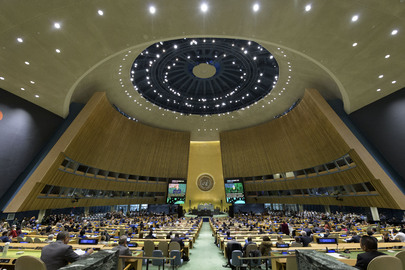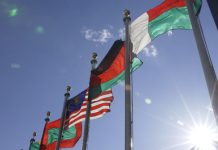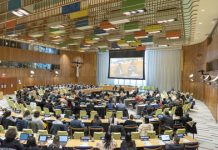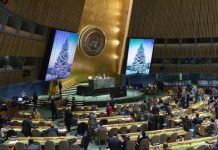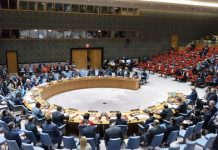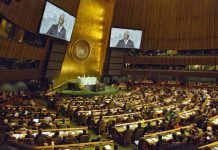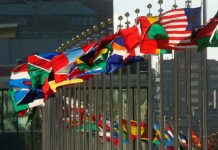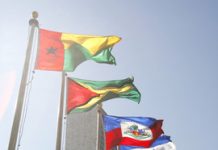“I’m afraid of men, of everyone, of everything,” she told the United Nations sexual and reproductive health agency (UNFPA).
FGM, a practice that involves altering or injuring the female genitalia for non-medical reasons, is internationally recognised as a violation of fundamental human rights.
It is a global issue, reported in 92 countries across all continents, with over 230 million girls and women having survived it in the world.
Data from about a third of the countries where the practice is still common have indicated a decline over the last three decades, with one out of three girls undergoing the practice compared to one out of two girls previously.
While steps in the right direction have been taken, in 2025 alone, nearly 4.4 million girls are projected to be at risk. Positive results would need to be stepped up drastically to meet the target of ending the practice by 2030.
Hawa’a Mohamed Kamil is a survivor of female genital mutilation in Djibouti.
Breaking the cycle
Hawa’a works together with Elle&Elles, a UNFPA network which supports and trains female leaders advocating for women’s health and rights.
She travels from Djibouti City to remote villages to raise awareness, including among boys, who can play a crucial role in shifting societal attitudes.
She also persuaded her own family members to adopt her message: abandon female genital mutilation – simple yet revolutionary for such a traditional area.
Meanwhile, in the northern-central Tadjourah region, 39-year-old Khadija crosses miles of unforgiving terrain to encourage families to spare their daughters from the procedure.
After the UNFPA-UNICEF Joint Programme on the Elimination of Female Genital Mutilation – the largest global programme to accelerate the elimination of FGM – visited her village of Otoy with an awareness-raising session, she decided to join the cause.
Khadija advocates for the elimination of female genital mutilation in Djibouti.
“Twenty-five years ago, I let my daughter go through female genital mutilation,” she told UNFPA. “But I have vowed to protect my granddaughter.”
A survivor herself, Khadija has seen the pain that follows female genital mutilation, as well as the infections, complications during childbirth and even tragic deaths.
“We lost many women who bled to death before they could reach a health facility,” she said.
She began weaving her message of change into conversations first with women, then men, and even religious leaders.
But their journey was far from smooth, as both women described being ostracised by their communities and chastised for spreading false information. “People suspected my motives,” recalled Khadija. “They couldn’t believe I was doing this for free, from my heart.”
Yet their commitment remains unshaken. “I am proud of the change we see today,” said Hawa’a.
For Khadija, the transformation has been remarkable: Her village recently made a public declaration to abandon the practice for good. “Change takes time, but it comes eventually,” she said.
Ibrahim, a teacher at a school in the Tadjourah region advocates against female genital mutilation.
A lesson in resistance
At a nearby school, the classroom buzzes with young voices reciting French phrases in unison. Beyond the lessons in grammar and vocabulary, however, 31-year-old Ibrahim is teaching something more profound – the value of girls’ rights and well-being.
“I made a vow that if I got married and had baby girls, I wouldn’t subject them to this and make them suffer,” he told UNFPA.
Ibrahim brings awareness of female genital mutilation’s harms into his lessons, gently guiding his young students towards a future where girls are empowered and their health safeguarded.
But when his first daughter was born, Ibrahim had to choose between upholding his promise and confronting opposition from his family, including his wife and grandmother. He chose to keep his promise.
“The most important thing is health,” he said. “I urge all families to take care of their girls’ health and to not cut them.”
His stance against female genital mutilation has rippled through his community, where over 100 people now oppose the practice.
Mother of five Hawi Mohammed is a survivor and community activist against female genital mutilation.
A religious woman leads the charge
Hawi Mohammed, 46, is a mother of five, fervent community activist, respected local religious leader, and a survivor of one of the most severe forms of female genital mutilation.
She is also a prominent member of the Shamikhat Djibouti network – a regional religious leaders’ group against female genital mutilation.
As a child she was subjected to what is often referred to as infibulation, in which part or all of a girl’s external genitalia are removed and the opening sealed over. An agonising and dangerous procedure, it can lead to severe bleeding, infections and all too often death.
Hawi said she only understood the full extent of the violation when she hit puberty: the pain, especially during menstruation, was excruciating. “I couldn’t go to school. I needed painkiller injections just to function,” she emphasised.
Her fury fuelled her advocacy, and she now hosts a popular radio and television programme in the Afari language, delivers lectures in mosques that challenge traditional interpretations and emphasise the true spirit of Islam.
“People used to run away when we talked about female genital mutilation,” she explained. “But the new generation is different. Mothers are educated, informed. They are doctors, activists, and teachers.”
Hawi’s own daughters and nieces are living proof of her commitment: Despite facing pressure from family and community members, she refused to subject them to female genital mutilation.
“I’ve gone through enough pain – I won’t let any girl suffer like I did,” she said.
Multilateral action
As the International Day of Zero Tolerance for Female Genital Mutilation approaches on 6 February, UNFPA is highlighting the importance for the international community to invest in resources, foster open discussions and challenge social norms, alongside local activists’ work.
This year’s theme, “Stepping up the pace: Strengthening alliances and building movements to end FGM,” underscores the critical need for collaboration. It urges all actors from youth to governments to take action.
“As agents of change, everyone has a role to play in ensuring girls grow up free from this harmful practice. The urgency to unite efforts in abolishing FGM has never been greater,” wrote the agency.
Source of original article: United Nations (news.un.org). Photo credit: UN. The content of this article does not necessarily reflect the views or opinion of Global Diaspora News (www.globaldiasporanews.com).
To submit your press release: (https://www.globaldiasporanews.com/pr).
To advertise on Global Diaspora News: (www.globaldiasporanews.com/ads).
Sign up to Global Diaspora News newsletter (https://www.globaldiasporanews.com/newsletter/) to start receiving updates and opportunities directly in your email inbox for free.


